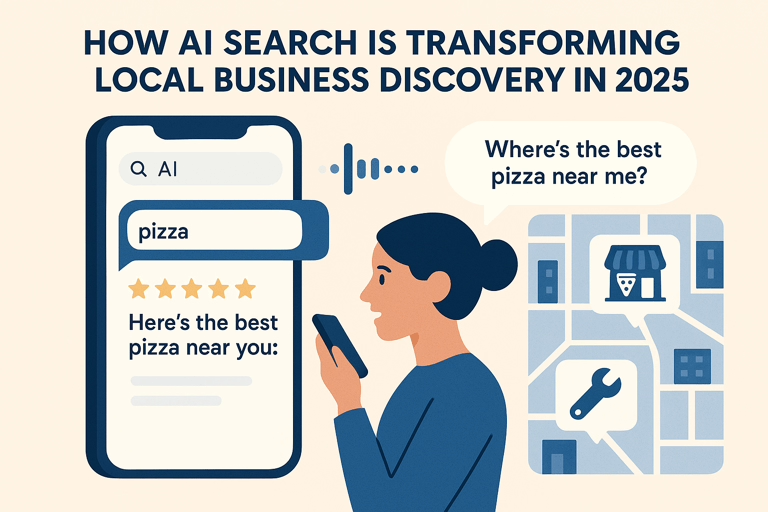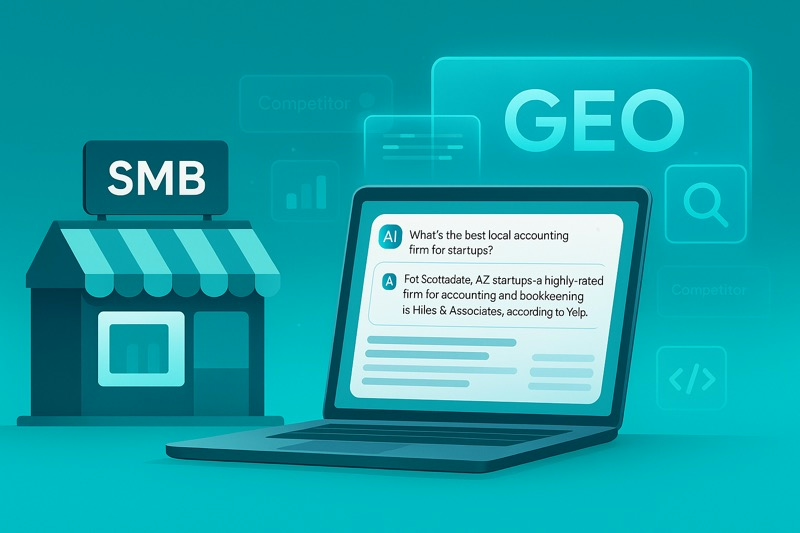How to Optimize for AI Search: A Complete WordPress Guide for 2025
Understanding the AI Search Revolution
The search landscape is undergoing a fundamental transformation. If you’re wondering how to optimize for AI search effectively, you must first understand what differentiates it from traditional search. While conventional search engines have focused on matching keywords and ranking web pages in a list of blue links, AI-powered search delivers direct answers, summaries, and recommendations generated by artificial intelligence. This shift requires a new optimization approach that focuses on making your content easily understandable and valuable to AI systems.
AI search optimization (AISO) refers to strategies that help your WordPress website be found in AI-driven search results, from voice assistants like Siri to today’s generative AI search tools and future AI systems. According to recent research by Higher Visibility, over 71% of Americans already use AI tools for search, and 14% use them daily. The businesses that fail to optimize for AI search risk becoming invisible to a growing audience segment. As we explain in our AISO fundamentals guide, learning how to optimize for AI search represents a critical shift in how businesses approach online visibility.
Traditional SEO vs. AI Search Optimization: What’s Different?
To successfully understand how to optimize for AI search, you need to recognize how it differs from traditional SEO:
| Feature | Traditional SEO | How to Optimize for AI Search |
| Primary Goal | Rank high in search results pages | Be featured in generated answers |
| Content Focus | Keywords optimization and density | Entity relationships and comprehensive information |
| Structure Priority | Title tags and meta descriptions | Clear question-answer formats and semantic structure |
| Technical Priority | Indexability and site speed | Schema markup and entity identification |
| Link Strategy | Building backlinks from other sites | Creating relational, citation-worthy content |
| Success Metric | Page rankings for target keywords | Inclusion in AI-generated responses and summaries |
While traditional SEO focuses on technical factors and keyword optimization to improve rankings, learning how to optimize for AI search emphasizes content quality, entity relationships, and structured data to become the trusted source that AI systems reference.
7 Essential Strategies to Optimize Your WordPress Site for AI Search
1. Focus on User Intent and Conversational Queries
Understanding how to optimize for AI search begins with focusing on user intent and conversational queries. AI search excels at understanding natural language and conversational queries. Rather than optimizing for keyword phrases like “leather jacket sale,” optimize for conversational questions like “Where can I find affordable leather jackets near me?”
Action steps:
- Research questions your audience asks about your products/services
- Create dedicated content that directly answers these specific questions
- Use natural, conversational language throughout your content
- Structure content in question-answer format where appropriate
2. Implement Comprehensive Schema Markup
Schema markup is code that helps search engines understand the content and context of your website. For AI search, it’s essential as it provides clear signals about entities, relationships, and attributes on your page.
Action steps:
- Implement an organization and local business schema for your company information
- Add product schema for e-commerce pages
- Use FAQ schema for question-answer content
- Implement a review schema to highlight customer feedback
- Use the HowTo schema for instructional content
WordPress plugins like Rank Math and Schema Pro can simplify schema implementation without requiring coding knowledge. For a detailed tutorial on implementing schema markup for WordPress, check out our schema implementation guide.
3. Create Entity-Rich, Comprehensive Content
AI search systems are trained to understand entities (people, places, things, concepts) and how they relate to each other. Creating content that clearly defines entities and their relationships helps AI systems understand and reference your content.
Action steps:
- Clearly define key entities in your industry and how they relate to each other
- Create comprehensive resource pages that thoroughly cover topics
- Include relevant data, statistics, and facts that AI might extract
- Link related concepts within your content to build semantic connections
- Develop content clusters around core topics to demonstrate expertise depth
4. Optimize for Featured Snippets and Direct Answers
AI search often pulls from the same content sources in featured snippets. Creating content specifically formatted to be extract-friendly increases your chances of being featured in traditional and AI search results.
Action steps:
- Format key information in short, direct paragraphs
- Use bullet points and numbered lists for processes and steps
- Include concise definitions for industry terms
- Create comparison tables for products or concepts
- Answer what, why, who, where, when, and how questions clearly and concisely
5. Focus on E-E-A-T Signals (Experience, Expertise, Authoritativeness, Trustworthiness)
AI systems are designed to prioritize trustworthy, accurate information from credible sources. Demonstrating your E-E-A-T signals helps establish your content as citation-worthy for AI systems.
Action steps:
- Include author bios with relevant credentials
- Link to authoritative sources to support claims
- Keep content updated and factually accurate
- Display clear contact information and about pages
- Showcase relevant experience and first-hand knowledge
- Include testimonials and case studies to demonstrate practical expertise
6. Technical Optimization for AI Crawlability
While AI understanding goes beyond traditional technical SEO, having a technically sound website remains vital for AI systems to access and process your content correctly.
Action steps:
- Ensure clean HTML structure with semantic markup (H1, H2, H3, etc.)
- Maintain fast loading speeds and mobile optimization
- Use descriptive URLs that include key entities
- Implement proper image alt text with contextual descriptions
- Ensure content is accessible to all users, including those with disabilities
7. Voice Search Optimization
Many AI interactions happen through voice interfaces. Optimizing for voice search means understanding the unique characteristics of spoken queries.
Action steps:
- Target longer, conversational phrases
- Answer questions directly and concisely
- Optimize for local searches with location-specific information
- Focus on question phrases beginning with who, what, when, where, why, and how
- Ensure your business information is consistent across all platforms
Tools to Help with AI Search Optimization
Several tools can help you implement AI search optimization strategies for your WordPress website:
- AISO Analyzer plugins – Analyze your content for AI search readiness, like our free AISO Analyzer plugin
- Schema Markup Generators – Simplify the creation and implementation of structured data, such as Schema.org’s Markup Helper
- Natural Language Processing (NLP) tools – Analyze and improve your content for entity recognition using services like Google’s Natural Language API
- Content Optimization Platforms – Provide AI-driven recommendations for comprehensive content with tools like Frase or Surfer SEO
- AI Search Testing Tools – Test how your content might appear in AI-generated responses through our AISO readiness assessment tool
Common AI Search Optimization Challenges and Solutions
Challenge: Content Not Appearing in AI Search Results
Solution: One of the main concerns when learning how to optimize for AI search is visibility in AI-generated results. To address this, ensure your content directly answers common questions in your niche and implements proper schema markup. Focus on creating comprehensive, factually accurate content that clearly explains entities and relationships in your industry.
Challenge: Difficulty Creating Structured Data
Solution: Many WordPress site owners struggle with implementing structured data when figuring out how to optimize for AI search. Utilize WordPress plugins designed explicitly for schema markup implementation. Tools like Schema Pro or Rank Math can simplify the process with user-friendly interfaces that don’t require coding knowledge.
Challenge: Keeping Up with AI Search Evolution
Solution: Learning to optimize for AI search requires staying current with evolving technologies. Join industry communities like Search Engine Journal, subscribe to search news publications like Search Engine Land, and regularly test your content with AI tools. Follow our AI search trends blog for the latest updates and developments. The core principles of quality, structured, comprehensive content will remain valuable even as specific techniques evolve.
The Future of AI Search Optimization
As AI search continues to evolve, understanding how to optimize for AI search will become increasingly important. Several trends are likely to shape the future of this field:
- Multimodal search combining text, voice, image, and video inputs
- Personalized AI responses tailored to individual user preferences and history
- AI agents that perform tasks rather than just providing information
- Increased importance of factual accuracy and source credibility
- Greater emphasis on conversational interaction with search interfaces
According to Gartner, by 2026, search volume will drop 25% due to AI Chatbots and Other Virtual Agents. This shift is explored in our detailed future of search report, which examines how to optimize for AI search as these emerging technologies become mainstream.
By implementing AI search optimization strategies today, you’re not just preparing for current AI search tools but future-proofing your online presence for the continued evolution of search technology.
Conclusion
Learning how to optimize for AI search represents a significant shift in how businesses approach their online content strategy. Rather than focusing solely on keywords and rankings, successful AI search optimization requires creating content that AI systems can understand, trust, and reference.
For WordPress website owners who want to know how to optimize for AI search effectively, this means implementing structured data, creating comprehensive content that clearly defines entities and relationships, optimizing for direct answers, and establishing strong E-E-A-T signals. By taking these steps now, you position your business to maintain visibility as more users shift to AI-powered search experiences.
Ready to optimize your WordPress site for AI search? Contact AgenticPress today for a free AISO analysis and discover how we can help your business implement strategies to optimize for AI search that will help your business thrive in this new era.
This article was last updated on April 8, 2025. For the latest AI search optimization techniques, subscribe to our blog or check back regularly for updated content.



